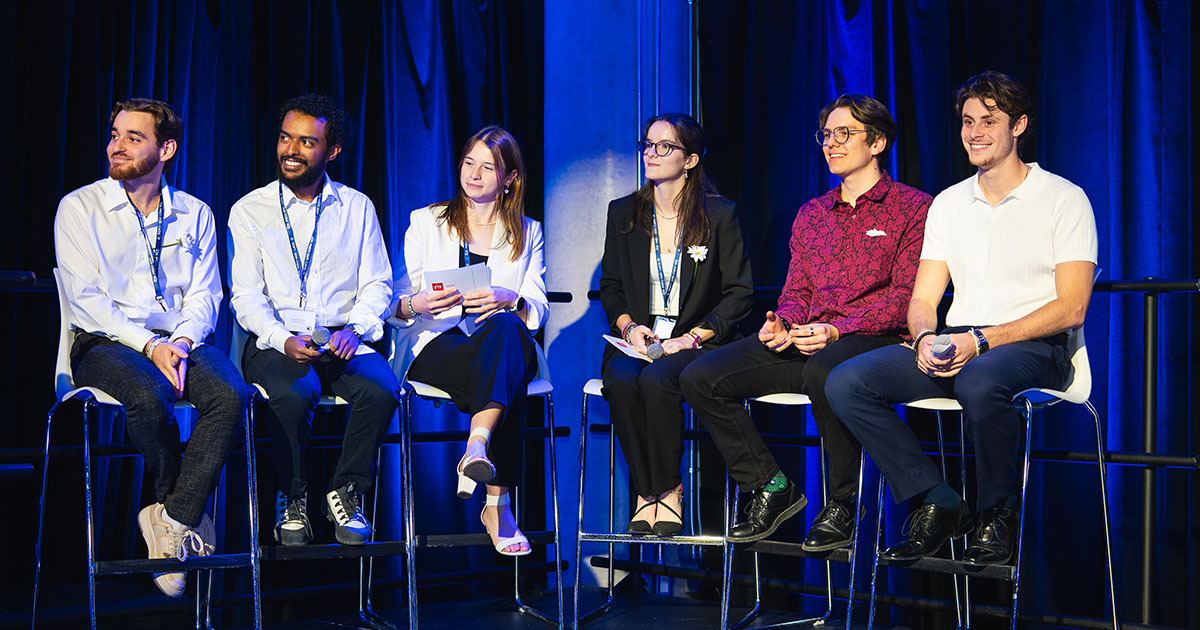
Electrical Engineering aims to find solutions to specific problems, while Systems Engineering focuses on the global aspect of operations. “Communication between drones is electrical engineering; monitoring a drone launch is systems engineering,” explains Lokman Sboui.
Professor Sboui holds a PhD in Electrical Engineering and teaches in the Systems Engineering Department at ÉTS. The meeting point between these two engineering fields may well lie in the Internet of Things, which has fascinated Lokman since his master’s studies.
At a very young age, Lokman Sboui was interested in wireless communication. So it was only natural that he should choose Electrical Engineering for his studies.
The Link between Tunisia and Saudi Arabia
As a student at Tunisia’s École Polytechnique, Lokman Sboui wanted to pursue his final year project abroad, more specifically at KAUST University in Saudi Arabia, renowned for its avant-garde approach to technology. Professor Mohamed-Slim Alouini, one of the most influential researchers in the field of wireless communication, agreed to take Lokman Sboui under his wing. Before the young student had even completed his bachelor’s degree, he was accepted to a master’s in Electrical Engineering at KAUST University.
Cognitive Radio… A Premature Idea?
In 2011, talk of saturation in the wireless communications spectrum was beginning. New technologies were being investigated. Cognitive radio seemed promising. Lokman devoted his master’s thesis to this emerging technology, which focuses on detecting and sharing the unused spectrum of frequency bands. “If the primary network operator provides service to users in one area but has no users in another, it becomes an opportunity for a secondary operator to share this unused band with its own customer base.”
But it’s a long way from research to application. In ten years, short-range stations have multiplied and cognitive radio has not really been embraced as a solution to spectrum congestion for wireless communication. Lokman Sboui doesn’t like to dwell on vague, unclear projects—he needs something tangible.
Changing the Course of his Destiny
Sboui wanted to enter the job market as soon as he earned his master’s degree. He received an offer from Toyota, where he would test the concept of wireless communication controlled by a car’s touch screen. Sboui was about to accept the offer when Professor Alouini suggested another route. After weighing the pros and cons, Lokman opted for a PhD in Electrical Engineering and an internship with Saudi Aramco, the world’s most lucrative oil company. Lokman designed a wireless communication protocol for cyber-physical robots. There, he discovered a passion for the Internet of Things. He earned his PhD in Electrical Engineering in 2017.
A Conference in Montreal
Lokman Sboui came to Montreal three times for conferences and internships during his studies. Always in summer. It was wonderful. At one of these meetings, Lokman confided to François Gagnon, then professor of Electrical Engineering at ÉTS that he wished to pursue an industrial career after his PhD. Gagnon suggested a postdoctoral internship at ÉTS as a transitional step. Lokman Sboui followed this sound advice, and gained a foothold in industry while carrying out projects close to his heart.

KoomBook and Media5: Two Milestones
In 2018, Lokman Sboui settled in Montreal with his family, had a taste of winter, and got used to it. During his postdoctoral internship, he carried out two projects that made him especially proud. He took part in the KoomBook project, which gave two isolated villages in the Ecuadorian forests access to a scaled-down version of the Internet. The KoomBook is a book-size mini-server containing a hard disk and a WiFi terminal. People can connect using their mobile devices and access thousands of educational and cultural resources. Sboui also helped train four young Ecuadorians in the technology who, in turn, launched their own businesses to help other remote villages connect to the KoomBook.
The second project Sboui participated in during his postdoc took the form of an algorithm. Then a researcher at Media5—a gateway manufacturer for voice telephony—Lokman collaborated on developing an application that measures voice quality of communications in real-time. “When transmission deteriorates, an alert is sent to the network administrator to correct the problem,” explains Lokman.
Lokman Sboui enjoyed his experience at ÉTS. So, when he heard that the school was looking for professors, he decided to apply.
He Became a Systems Engineering Professor
“ÉTS is different from other universities in that it is very closely linked to industry.” Nine months later, he received a positive response from the Systems Engineering Department. “I had the most difficult interview of my career…in front of eighteen professors!”
Teaching People to Be Useful
Lokman Sboui chose teaching in order to pass on his knowledge and expertise, of course, but he also intends to enrich his students’ knowledge with real-life experience. So while these future engineers are connecting a robot’s electrical sensors, they must be ready to answer this increasingly critical question: What is it for?
“The ultimate goal is to have a truly beneficial impact on people’s lives,” concludes Professor Sboui.



